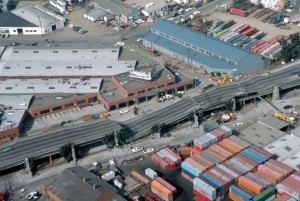Does Destroying Highways Solve Urban Traffic Congestion?

Aerial view of collapsed sections of the Cypress viaduct of Interstate Highway 880 in Oakland, California in 1989. (H.G. Wilshire, U.S. Geological Survey)
Strange how the traditional laws of supply and demand go out the window when it comes to traffic. Studies over the last decade (like this one, this one, and this one; plus the book Suburban Nation) have pretty much dismantled the theory that more roads equal less traffic congestion. It turns out that the opposite is often true: building more and wider highways can increase traffic congestion. If only people like Robert Moses and Le Corbusier had known this before their grand urban plans left our cities clogged with traffic, and carved up by ugly, value-destroying highways.
As part of its series on urban transportation, the Mother Nature Network has this recent post, which includes a nice rundown of the evidence against highways as congestion relievers, plus a discussion of the latest idea taking hold in urban traffic management circles: destroy highways to reduce congestion.
A particularly dramatic case in point comes to us from traffic-clogged Seoul, Korea, where a few years ago a handful of “crazy” visionaries in the transport department somehow managed to sell a new mayor on the demolition of an elevated downtown highway. Fast-forward to today: the highway’s gone, a formerly paved-over river has been rehabilitated, the resulting green space is a source of urban pride, and — wait for it — motor vehicle travel times have actually improved in the neighborhood of the old highway.
The MNN piece reminds us that highway tear-downs have had similar results in New York City and San Francisco, but that it took natural disasters for those to happen: New York’s West Side Highway collapsed under the weight of a cement truck in 1973, and San Francisco’s Embarcadero Freeway was removed after suffering damage from the Loma Prieta earthquake in 1989.
One final tidbit on the economic costs of traffic: according to the Texas Transportation Institute, traffic congestion costs us $87 billion a year in wasted fuel. And that’s not even counting all those hours lost (and road rage)!

Comments